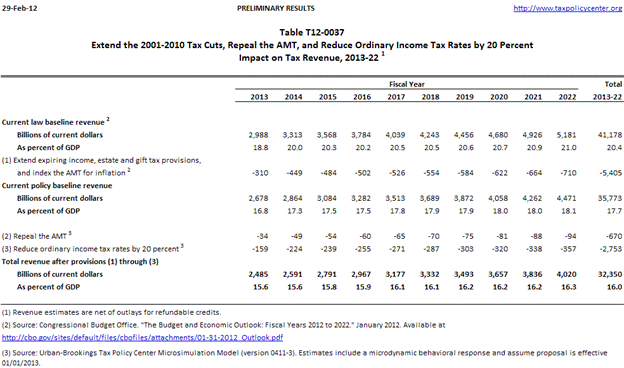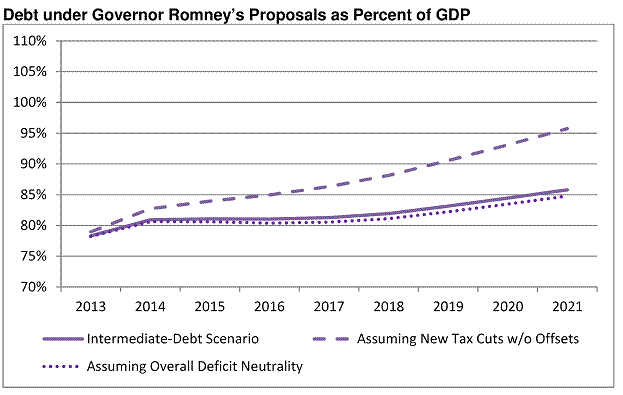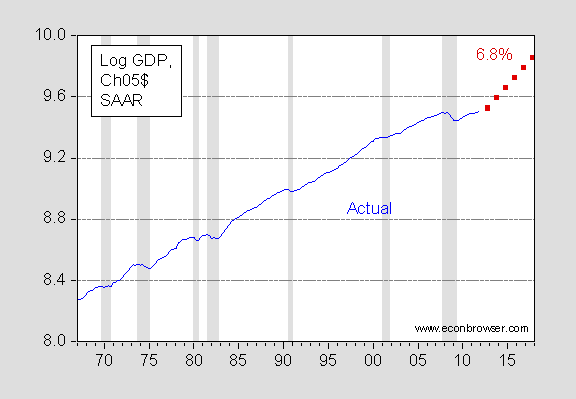Well, this could be a short blogpost, because in Mitt Romney’s words, “frankly it can’t be scored” [The Hill]. However, I think it of interest to consider what it would take to make the Romney plan deficit neutral, as he has argued it would be.
What can one say, given this constraint of vagueness? One could calculate the tax revenue losses in a static sense, as the Joint Urban-Brookings Tax Policy Center did.

Table T12-0037 from TPC (February 29, 2012).
TPC found that repealing the AMT and cutting rates by 20 percent would increase the deficit by more than $3 trillion over the next 10 years, even after the 2001/2003/2010 tax cuts are extended.
The loss is $8.8 trillion if those reductions are combined with permanent extension of the 2001 and 2003 tax cuts. If however, other proposed tax cuts are implemented, the revenue loss would be even larger. The Committee for a Responsible Federal Budget has tabulated the impact on the Federal debt held by the public, assuming no spending cuts (h/t [Krugman]).

Figure from Committee for a Responsible Federal Budget.
The dashed line is what happens if the tax cuts are implemented, and no spending cuts relative to CRFB baseline implemented. One can compare against the CRFB assessment of the President’s budget here.
What about a revenue increase for a given tax reduction, a la Laffer and Wanniski? Well, we are all supply-siders. I use the aggregate supply-aggregate demand framework common in undergraduate textbooks to think about the effects of tax and expenditure policies. The issue is what is the strength of these effects, and at what horizons those effects hold (see this post on the Bush Treasury analysis here). Using the more comprehensive estimates of static revenue loss, ThinkProgress has reverse-engineered the GDP growth rate required to keep revenues at baseline by 2017: it’s 6.8%.
For the Romney tax plan — which raises 15 percent of GDP — to generate the same $3.5 trillion that current policies would generate under “normal” conditions, GDP in 2017 would need to be over $23 trillion. That’s about 18% higher than the current projection. To get there from this year’s GDP would require annual 8.5 percent growth in nominal – i.e. not inflation adjusted – GDP each year starting in 2013. After using the CBO’s GDP index to adjust for inflation, 8.5 percent nominal growth becomes 6.8 percent real annual growth.
This growth path for real GDP is depicted in Figure 1 below:

Figure 1: Log actual GDP (blue) and GDP with 6.8% growth from 2012Q4 onward (2012Q4 figure is implied from February 2012 WSJ survey) (red squares). NBER defined recession dates shaded gray. Sources: BEA, 2011Q4 second release, WSJ, NBER, author’s calculations.
I leave it to readers to determine whether this outcome is plausible.
Of course, Governor Romney has proposed spending reductions of $500 billion (presumably per year) [1]. If this is successfully undertaken, then the required growth rate would be less. The Joint Tax Center’s Table T12-0037 indicates 16% revenues over the next ten years (even when not including all the proposed tax cuts), while Romney has promised to cap spending at 20% of GDP. [2] That implies a 4 percentage points of GDP gap on average over the next ten years.
Governor Romney has stated he wishes to eliminate tax expenditures. Doing so would clearly increase tax revenues substantially (see this post). However, he has not identified exactly which tax expenditures (home mortgage deductability, deductability of health care insurance, etc.) he would be willing to target.
Obviously, it is possible that that trend growth increases to 6.8%, or that massive spending cuts are implemented. Whether it would be likely is another matter. I suspect that in order for this scenario to come to pass, some supply side elasticities of the magnitude such as those used in the Heritage Foundation/Center for Data Analysis of the Ryan plan would be necessary. [3] [4] [5]
Here is the best analysis of the Romney plan that I have read. [Warning: no Sudoku]
Ricardo Maybe no Sudoku, but no link either. And why do I have this sinking feeling that your “best analysis” probably involves something written by Stephen Moore or Don Luskin?
2slugbaits: Ricardo omitted an “h” in his html “a href” command; I have just fixed, so now you can read the link, but if you value your brain cells, I would advise against. It is by Ed Breen, and contains exactly 4 numbers.
I don’t think any healthcare policy will do any good unless it addresses the supply side.
I’d like to see maybe a reduction in income tax rates and corporate (potentially elimination of corporate rates), but treat capital gains as income.
Eliminating tax perks for employee benefits would likely do wonders or the long term for insurance and healthcare costs.
Sorry for jumping the gun and comment before reading the post in my first comment. I had just read this on RomneyCare and though that’s what you were doing too.
Healthcare being the primary driver of our financial problems.
Four numbers? That’s too many. Numbers are hard.
8(
Governor Romney has stated he wishes to eliminate tax expenditures. Doing so would clearly increase tax revenues substantially (see this post). However, he has not identified exactly which tax expenditures (home mortgage deductability, deductability of health care insurance, etc.) he would be willing to target.
We can speculate, right? With a 20% reduction in rates, it would pretty much have to eliminate every single tax expenditure, wouldn’t it?
Personally, I would take that tradeoff. It would make the economy more efficient. But employers, insurers, and real estate agents would go nuts, no doubt.
Menzie,
Thanks for fixing the link.
Sorry you couldn’t understand Ed’s analysis. I guess I overlooked the 4 numbers.
It was good of you to recommend that Slug not read it. He wouldn’t understand it. Most of the other people here will.
1. Each time I read a comment by “Ricardo”, I long for the old days of the internet when idiots were hounded out of newsgroups. Must be Ricky Ricardo, not David. Babaloo, baby.
2. Romney can’t say what he’d cut because no one would vote for those cuts. The list of the largest tax preferences is a list of the middle and upper middle class, notably the mortgage interest deduction. People irrationally believe a number of things, including: a) the believe the poor have money, which they don’t. When Romney says the tax base “needs to broadened” that is taken as referring to taxing those people so they have “skin in the game.” b) they assume the government is bigger than it is. A cut of $500B would essentially eliminate all the federal government, from roads to Veterans’ Affairs. You can’t then eliminate it the next year. This means cuts would need to come from Medicare, Medicaid and defense. There are no other sources for cuts. People don’t think that is true. Heck, a group affiliated with the GOP is now running a piece that accuses healthcare reform of cutting Medicare through a panel that advises on prices. Imagine how many votes Romney would get if he came out and said, “Tax cuts will be paid for by eliminating Medicare.” That’s the only way he could start to pay for them.
Ricardo You’re right…I didn’t understand the Breen paper. My takeaway is that he criticizes Romney’s plan for being intellectually dishonest and then Breen goes on to praise some of the stupidest ideas in Romney’s plan. So yes, that sort of thing leaves my head spinning. But I’m just a poor ol’ country boy from the Chicago burbs. Then again, Breen is a lawyer, so I don’t see how that exactly qualifies him to comment on economic policies.
Breen thinks it’s a good idea to abolish the “death tax.” Perhaps you could explain why this is a good idea. Does that mean you can’t die until you pay a tax? If so, then wouldn’t abolishing the tax increase the death rate? Or maybe Breen is talking about the federal estate tax. As I understand it, you only pay an estate tax if you die, and even though I did grow up in the Chicago area, I don’t think it’s common for dead folks to vote. But living folks do vote, and abolishing the estate tax is effectively a tax increase on the living. Are you saying that it’s better to tax the living than the dead? Like I said, I didn’t understand Breen’s argument at all.
Slug,
I doubt I would be able to educate you. My only suggestion is that you get as much real experience in running businesses as Ed Breen has and then come back and read it again. Probably the single most gap in the education of economists is they have spent their entire lives in academia and have no idea what is required to actually run a business.
Did you even know about the difference in tax treatment of the C-Corps and the S-Corps before you read Ed’s analysis? Do you even now know? That would help you understand the destructive nature of the “death tax.”
Ricardo Sounds like you’re trying to duck my question. Do you prefer to tax the living or the dead? It’s a simple question.
As to S-Corps and C-Corps, I’m dumb as dirt, but I’m pretty sure that I know enough about them to understand that Breen contradicted himself. First he said that he wanted to reduce the tax rate for S-Corp owners so that they would not be at such a disadvantage relative to C-Corps shareholders. Then he said that he wanted to eliminate the “double taxation” of dividends on C-Corps income. Doesn’t that just re-introduce a new wedge? He’s just confused here.
That said, I do not see how S-Corps and C-Corps treatments relate to the estate tax. As I understand it S-Corps and C-Corps rules are all about taxing income of the living, and not about taxing the estates of dead people.
Is there a compelling economic argument for not using an estate tax to relieve the income tax burden on the living? Afterall, we do know that the expectation of a large inheritance actually shrinks the labor supply curve, so if you’re a supply sider you should be arguing for a very high estate tax.
Slug,
Your questions is a little silly but I will respond. When you tax the dead you are actually attacking their offspring that they worked all their lives to support. Personally I think it is sick to tax the dead through their offspring because they no longer have the ability to defend themselves. But the big tax folks always tax the defenseless so what’s new?
You obviously do not understand S-Corps versus C-Corps so discussing it would be a waste of time. I suggest that those who do understand read Ed Breen’s article on this. I posted a link earlier. It is specifically about Mitt Romney’s tax plan but it will give you a very good reference concerning why the federal tax system has the corporate tax system so screwed up and how their recommendations will simply make it worse.
Ricardo I don’t see why the question is silly. If we give up $25B/year in estate taxes then that necessarily means we have to increase some other taxes on the living by $25B. It’s just an iron law of arithmetic. Calling it a silly question is just rather transparent way of telling me that you would rather not address the substance of the question because you don’t really have a coherent answer.
As to the dead being defenseless…perhaps, but they won’t know the difference. In my book I’d rather tax the dead than tax the living.
But I noticed that you have tried to shift the argument. The Breen article tried to argue for a lower estate tax based on supply side reasons. You are trying to shift the discussion to some half-baked issue about fairness to the dead. What is the supply side argument for not having an estate tax? I’ll give you a supply side argument for having one: because people who inherit estates fall out of the labor force, which contracts the labor supply curve. For example, in “The Effect of Inheritance Receipt on Retirement,” Jeffrey Brown, Courtney Coile and Scott Weisbenner, July 2006. Estate and inheritance taxes are good supply side economics for reasons. First, they reduce the income tax burden, which increases the return to working rather than consuming leisure. And second, estate and inheritance taxes discourage early retirement.
Slug,
You use the typical technique of changing the subject so that you do not have to debate a difficult question. I don’t mind debating the “death tax” but the thrust of Ed’s article is the treatment of S-Corps versus C-Corps. The S-Corps are the job creators while the C-Corps on the whole are Department of Commerce tax consummers with little increase in employment. The President’s tax plans always attempt to increase taxes on S-Corps under the guise of “taxing the rich,” but it actually reduces the ability of these businesses to engage in maintenance and business expansion creating jobs.
Just one point on the “death” tax, the amount of money involved is very small when compared to the total tax expenditures, but the burden that it puts on passing small family run businesses on to family members is devastating. The “death” tax takes 50% or more from those inheriting the small business and a 50% hit is more than most businesses can stand. I realize that by looking at the aggregate numbers you have a problem seeing this but those who lose their jobs because of this are well aware of the problem.